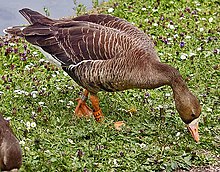쇠기러기
Appearance
Korean
[edit]
Etymology
[edit]Literally "small goose." From 쇠 (soe, “small”) + 기러기 (gireogi, “wild goose”).
Pronunciation
[edit]- (SK Standard/Seoul) IPA(key): [sʰwe̞ɡiɾʌ̹ɡi] ~ [sʰø̞ɡiɾʌ̹ɡi]
- Phonetic hangul: [쉐기러기/쇠기러기]
| Romanizations | |
|---|---|
| Revised Romanization? | soegireogi |
| Revised Romanization (translit.)? | soegileogi |
| McCune–Reischauer? | soegirŏgi |
| Yale Romanization? | soykileki |
Noun
[edit]쇠기러기 • (soegireogi)
References
[edit]- National Institute of the Korean Language (Naver.com mirror) (2007 January 7 (last accessed)) “쇠기러기 [soegireogi]”, in 표준국어대사전 [pyojun'gugeodaesajeon][1]
- Lee, Woo-Shin with Tae-Hoe Koo, Jin-Young Park (tr. by Desmond Allen) (2002) A field guide to the birds of Korea, Seoul: LG Evergreen Foundation, →ISBN
